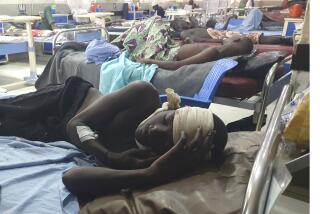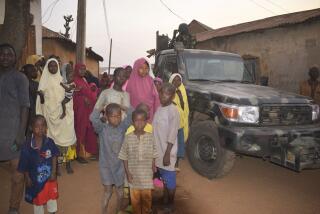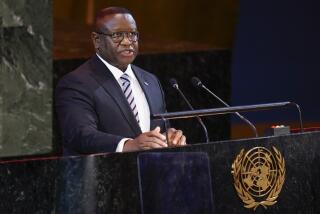Boko Haram attacks northeast Nigerian city, killing at least 30
reporting from MAIDUGURI, Nigeria â Boko Haram extremists struck the northeast Nigerian city of Maiduguri for the first time in months Monday, attacking with rocket-propelled grenades and multiple suicide bombers, witnesses said. At least 30 people were killed and the death toll could go higher, officials said.
The military said there were multiple attacks by the Islamic extremists at four southwestern entry points to the city, including a female suicide bomber who killed one other person and injured 13 gathered outside a mosque after dawn prayers.
The attack appears to be a challenge to President Muhammadu Buhariâs declaration last week that Boko Haram has been âtechnicallyâ defeated, capable of no more than suicide bombings on soft targets.
Nigerian troops âintercepted and destroyedâ 10 suicide bombers and repelled the attackers, according to PR Nigeria, an agency that disseminates government news.
Militants firing indiscriminately from the back of three trucks attacked the outlying village of Dawari, soldiers engaged them, and as people were fleeing, a woman ran into the area yelling âBoko Haram, Boko Haram.â When people gathered, she detonated a bomb she was carrying, according to village head Bulama Isa.
A rocket-propelled grenade exploded, setting fire to grass-thatched huts, and a second woman blew herself up, according to Isa. In Duwari, the village chief, 10 of his children and others were killed, according to residents Ahmed Bala and Umar Ibrahim.
A soldier said the insurgents fired rocket-propelled grenades into four residential areas on the outskirts of the city. Soldiers fired back, and many civilians were caught in the crossfire, according to the soldier, who spoke on condition of anonymity because he was not authorized to speak to journalists.
See more of our top stories on Facebook >>
A nurse and a guard at Maiduguri Specialist Hospital said at least 20 other bodies arrived overnight and that dozens of critically wounded people, mainly children and women, may not survive.
Maj. Gen. Lamidi Adeosun, the commander prosecuting Nigeriaâs war against Boko Haram, told reporters 29 people have been killed and 88 injured in attacks that began Sunday night.
The nurse, who spoke on condition of anonymity because she was not authorized to speak to reporters, said the hospital was so overflowing with patients that some had to be cared for in the maternity ward. About 60 people had wounds from bullets and shrapnel from explosive devices, she said. Other wounded people had to be sent to other hospitals in the city.
It was hard to do a body count because so many had been blown into pieces, she said, describing torsos and dismembered arms and legs.
âThe troops laid ambush on the terroristsâ suspected routes. ... The suicide bombers were intercepted in three different locations approaching the city,â PR Nigeria said, quoting the military.
Some slipped through. Three suicide bombers blew themselves up at a home near Bakassi Estate, killing 18 people Sunday evening, a soldier told the Associated Press on condition of anonymity because he was not supposed to speak to reporters.
NEWSLETTER: Get the dayâs top headlines from Times Editor Davan Maharaj >>
Maidugur is the birthplace of Boko Haram, which emerged as a much more radical entity after Nigerian security forces launched an all-out assault on its compound in the city, killing 700 people, in 2009.
The city of about 1 million people now hosts almost as many refugees, among 2.5 million people driven from their homes in the 6-year-old uprising. About 20,000 people have been killed in Nigeria and hundreds others elsewhere as the insurgents have carried their conflict across its borders into Cameroon, Niger and Chad.
ALSO
Not only Chinaâs wealthy want to study in America
South Korea, Japan reach deal on World War II sex slaves
South Korean single mothers turn to theater to strike back against stereotypes
More to Read
Sign up for Essential California
The most important California stories and recommendations in your inbox every morning.
You may occasionally receive promotional content from the Los Angeles Times.










